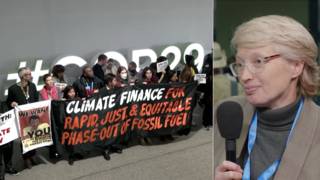
As the U.N. climate summit nears its close, we examine a proposed climate finance deal that is already being contested by participants. Among the major issues is the absence of a firm number in the draft text on how much rich countries will pay. Poorer nations bearing the brunt of the climate crisis say at least $1.3 trillion a year is needed, a target that comprises just 1% of the global economy. “We’re here to negotiate a global settlement on climate finance, which is all about getting the funds that the poor world needs in order to cut greenhouse gas emissions, shift to a low-carbon economy and adapt to the impacts of extreme weather driven by the climate crisis,” explains our guest Fiona Harvey, a longtime environment editor at The Guardian. Developed countries’ resistance to shifting their methods of industrial development, as well as the outsized role of fossil fuel lobbyists at the summit, has led to a deal that satisfies no one. However, says Harvey, for as long as their investment in fossil fuels creates the very problem “we are trying to solve,” it is crucial that wealthy nations commit to setting aside funding for poorer nations, as “the future of these countries depends on getting this finance.”
This post was originally published on Democracy Now!.